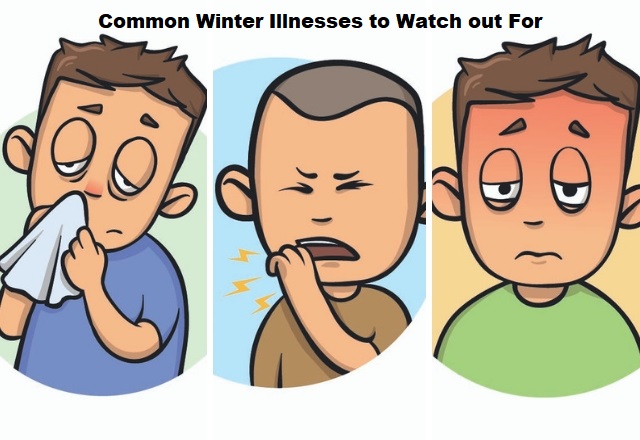Common Winter Illnesses to Watch out For
One of the notable conditions that the Christmas holidays bring is the weather condition it comes with. Winter can be a tough time for both kids and adults to stay healthy, more reason why we have to know the common winter illnesses to watch out for and how to prevent them.

Learning how to recognize common winter illnesses before they become chronic can make it easier to care for your children when they are sick. Knowing the signs and symptoms to look out for can also help you determine whether to visit a pediatrician or not.
Based on symptoms alone, determining which illness your child has can be difficult and is not advisable. The majority of illnesses have a lot in common, so being able to tell the difference is very important.
Colds
This essay will not be complete without mentioning this. Cold is one of the most common winter illnesses that keep children home from school. The Center for Disease Control and Prevention (CDC) has stated that adults have an average of 2-3 colds per year, and children have even more than that. These typically last between 7 to 10 days and can occur at any time of year.
Some common symptoms of cold include stuffy/runny nose, cough, sore throat, sneezing, and mild fever.
RSV (Respiratory Syncytial Virus)
RSV is a lung infection that usually lasts 1 to 2 weeks. RSV can be very serious in infants, so preventive measures should be taken to avoid this infection from getting to children.
Symptoms of this illness include cold-like symptoms with wheezing/whistle-like breathing that can cause rapid breathing that might require hospitalization.
Influenza (Flu)
This viral infection lasts from 3 to 7 days. Tamiflu can reduce the duration of the flu If taken within the first 48 hours.
Symptoms of this illness include Muscle aches, fever, headache, fatigue, dry cough, runny nose, and sore throat.
Croup
Croup is a viral infection that occurs during winter, it can last for 1 week.
Symptoms include barking cough and hoarseness with fever and runny nose.
Pneumonia
Pneumonia is a lung infection caused by a virus or bacteria that can last for 2 to 3 weeks. Bacterial pneumonia can be treated with antibiotics while viral Pneumonia can be treated with antiviral drugs.
Symptoms of Pneumonia include a cough with yellow or green mucus, chest pain, chills, high fever, and rapid breathing. Symptoms can come on rapidly.
Strep Throat
Strep throat is a contagious bacterial infection that can last for 1 to 2 days. This infection can be easily and quickly treated with antibiotics.
Symptoms of this infection include sore throat, trouble swallowing, fever, and stomachache. A sandpaper-like rash can develop, resulting in a diagnosis of scarlet fever.
Stomach Flu
A viral intestinal infection that can last for 1 to 3 days.
Symptoms include stomach pain, nausea, vomiting, mild fever, fatigue, and watery diarrhea.
How to Deal with Winter Illnesses
Items like nasal suction, saline drops, humidifiers, pain relievers, and vapor rubs should be kept handy. Make sure you sanitize doorknobs, toys, and commonly used surface areas to prevent germs from spreading.
Fever: Use acetaminophen (Tylenol) or ibuprofen (Motrin) based on the dosage provided by your pediatrician.
Nausea and vomiting: Try using small doses of electrolytes like Pedialyte to keep your child hydrated. Monitor how many times your child urinates to determine if they are dehydrated.
Stuffy nose and cough: Use vaporizers to help your child sleep better at night by loosening up the mucus in their lungs and nose. Vapor rubs and saline drops can also be used to alleviate symptoms.
Sore throat: A teaspoon of honey can help children over 12 months of age combat this problem. For older children, gargling warm salty water is a quick and easy remedy for this.
Tips: Preventing Winter Illnesses
Remember the saying ‘prevention is better than cure‘. Reducing the risk of common winter illnesses always begins and ends with washing your hands as frequently as possible. When you’re on the go, have some sanitizing gels, tissues, and wipes in your car or diaper bag.
Also, teach your children to cough or sneeze in a tissue or the crook of their elbow early on to establish healthy habits. Remember to sanitize toys weekly with soapy water or sanitizing spray. These are good ways to keep you and your family healthy all winter long.




Comment: I love my waptrick, is easy for me to download any i want faster, waptrick is the best app have ever seen.